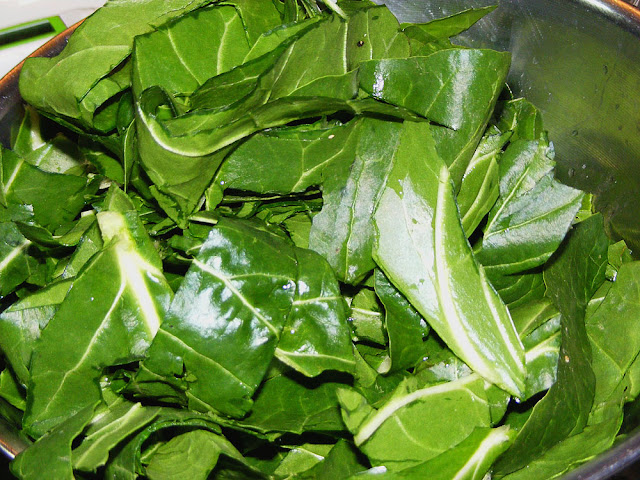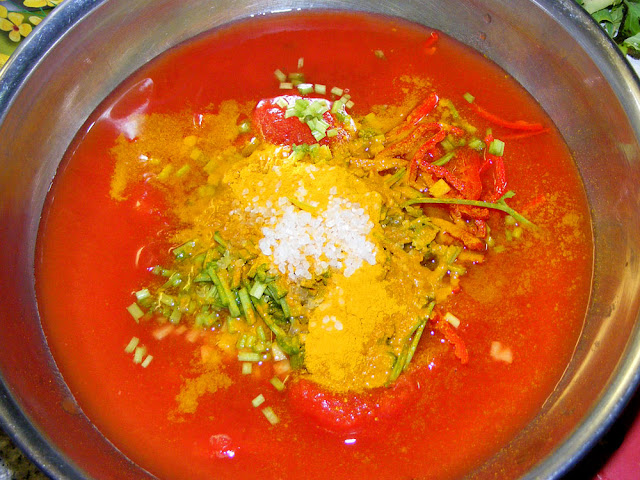First of all, an announcement, some news before we get on to the recipe for today: So
I've survived two weeks in a new job now. Ironically, at the height of
the Covid19 lockdown I've been offered a 6 month maternity cover job at
an on-farm small dairy processing unit. It's hard physical work at my
age but I'm hoping I'll cope better in a few weeks. The timing is just
about perfect to tide us over until maybe, just maybe, our American
clients can return to France and we can resume business. The government
aid for people like us in the tourist industry runs out at the end of
the year so far as we know, so most guides are desperately looking for
new ways of earning an income.
**************************************************
This is a vegetable curry. Aloo is Urdu for potato, gobi is cauliflower and sag spinach.
Organic cauliflower, grown in a local garden, cut into florets.
I love this dish. It is so intensely savoury, real comfort food. It's a great dish for trying with people who hate cauliflower or spinach. Carnivores are often quite happy to eat it. One person who is notably not happy to eat it is Simon, so if I make it, I have to have an alternative on hand for him.
Chard can be substituted for the spinach.
The quantities in this recipe are extremely flexible. If you have already taxed the cauliflower for a few florets to have with lamb chops and cheese sauce for dinner yesterday – don't worry – just chuck in another potato.
Tomato and spices mix.
Serves 3-6
Ingredients
1 cauliflower
3-4 potatoes
1 onion, peeled and cut into 6 wedges
1 small piece of fresh ginger root, finely chopped
1 can chopped tomatoes
1 fresh red chili, finely chopped
3-6 tablespoons vegetable oil
1 tablespoon cumin seeds
2 teaspoons tumeric
1 large bunch fresh green coriander, stalks and leaves chopped separately
1½ teaspoons ras al hanout or garam masala
1 teaspoon salt
100g fresh spinach (or in a pinch, a couple of blocks of frozen) – optional
Method
- Divide the cauliflower into florets and discard the trunk.
- Scrub the potatoes and cut into chunks 5-8cm across.
- Put the tomatoes into a bowl with their liquid. Rinse out the tin with about ¼ cup water and add this to the bowl. Put the tin in the recycling bin.
- Add the coriander stalks, tumeric, chili, ginger and salt to the tomatoes.
- Heat the oil on medium in a large deep frying pan (a kadai - one of those that looks like a heavy, flat based wok is traditional and ideal), then fry the cumin and onions until yellowish-golden but not brown. Yes, this is quite a lot of oil. You probably could use less, but if you have Pakistani or Indian friends and have watched them cook, you will know that they tend to be quite generous with the oil when frying off onions and spices. Flavour molecules tend to attach to fat molecules and become enhanced and accessible. The dish gains a textural quality as well as just imparting flavour sensations.
- Add the tomato mixture and fry for 3-5 minutes.
- Reduce the heat then add the cauliflower and potatoes. Stir well.
- Cover and let simmer over a medium low heat for 20-30 minutes, stirring occasionally, until the potatoes are done.
- Turn off the heat and add the chopped coriander leaves, spinach and spice mix. Stir carefully then cover and let stand while you cook rice.
- Serve with rice, dhal (lentils) and/or chapatis or naan.
I am not a fan of very hot food, although I like spicy. I see no advantage in spending a meal with eyes watering, nose running, sweating and gulping in cool air after every couple of mouthfuls, so I limit the chili. If your tolerance is higher, put in 2, 3 or even 4 chillies.
Mustard seed/rape/canola is probably traditional, but sunflower or peanut will be fine. Traditionally, quite large quantities of oil are used too, but you may wish to be more moderate and go for the lower limit suggested.
I know preparing the leaves and the stalks of the coriander separately sounds tedious and time consuming – but do it – it's worth it for the extra flavour you get. Wash the bunch of leaves and shake vigorously to get as much water as possible off. Dry your hands and pick off the leaves. If you have wet hands when you are pinching off the leaves they will stick to your fingers in a thoroughly irritating way. Chop the pile of leaves finely. Gather the stems together into a neatish bundle and cut them into 5mm lengths – shorter if you have the knife skills and patience. You can just gather the bunch together after washing and separate the leafy bits with one firm cut at wherever seems best in order to get a pile of stems and a pile of leaves, but this shamefully cavalier and impatient attitude doesn't produce quite as good a result.
Preparing the coriander can put you off making this dish. This step alone will take about 20 minutes if you approach it calmly and steadily. But for me the dish is so delicious and so comforting that I have been known to make it after a particularly frustrating day at the office when I thought I couldn't be bothered with food at all.
If you can't buy ras al hanout in the shops it is especially easy and economical to put together if you buy your spices in the generous quantities offered in shops or markets catering for people from Africa or India. To make the blend, combine 2 tablespoons ground cumin, 2 tablespoons ground coriander, 1 tablespoon turmeric, 1 teaspoon hot chilli powder, 1 teaspoon smoked sweet paprika and 1 teaspoon smoke essence. Store in a sealed jar and use as a rub on meats prior to grilling or frying, sprinkle on potato wedges, in recipes that call for garam masala or curry powder as well as ras al hanout.
What is smoke essence I hear you ask? Smoke essence is a brilliant idea from Sally Schneider's 'A New Way to Cook'. Take ½ cup Lapsang Souchong tea and whiz at high speed in a blender or spice grinder for 1 minute until it turns into a fine powder. Use it to give ordinary grilled meats and veg that straight from the barbecue flavour.
For details of our private guided tours of chateaux, gardens, wineries, markets and more please visit the Loire Valley Time Travel website. We would be delighted to design a tour for you.
We are also on Instagram, so check us out to see a regularly updated selection of our very best photos.
We are also on Instagram, so check us out to see a regularly updated selection of our very best photos.






11 comments:
Congratulations with your job! Huub
Susan, I keep my fingers crossed so you can keep it up until better times!
I agree that picking wet coriander leaves off the stems is a tedious bore.
I hope you'll blog about your maternity cover work. Sounds interesting
what do you do at your new job? Glad you were able to find something fairly close.
That's great news about the job, which I hope you'll find easier as you get more used to the physical side of it.
One spring I worked in a greenhouse where most of the other employees were teenage Mennonite girls, all used to hard work. I was the age of the owner's mother! At the end of a hard day's work I was worn out, while they hopped on their bikes and biked half an hour to get home, usually in cold weather.
Your job will give you insights into dairy processing that you never had before and you'll be able to add this farm to your tours (that is, unless you never want to see a farm again).
Like the recipe yum yum. Keep safe and have a good week, Diane
Thank you.
I got told off for bringing my camera on the first day -- 'there's to much to do to play around taking photos!' But my plan is that after the contract is done to visit one day and take a few photos for the blog. That's if I last :-) The boss and I really got on each others nerves this week.
It's a small dairy processing plant, so a small semi-automated factory for making yoghurt, desserts and bottling milk. There is lots of washing up and cleaning, as everything has to be spotless, and lots of putting together packs of yoghurts, making sure the machine is behaving, that the pots are coming out acceptable for sale.
It has already been easier this week physically. So far no significant insights into dairy processing except to confirm that no one in their right mind would be a dairy farmer. Sooooooo much work for so little reward. That aspect is actually quite shocking. And this is a country that treats dairy farmers better than most.
Let me know if you try it.
Post a Comment